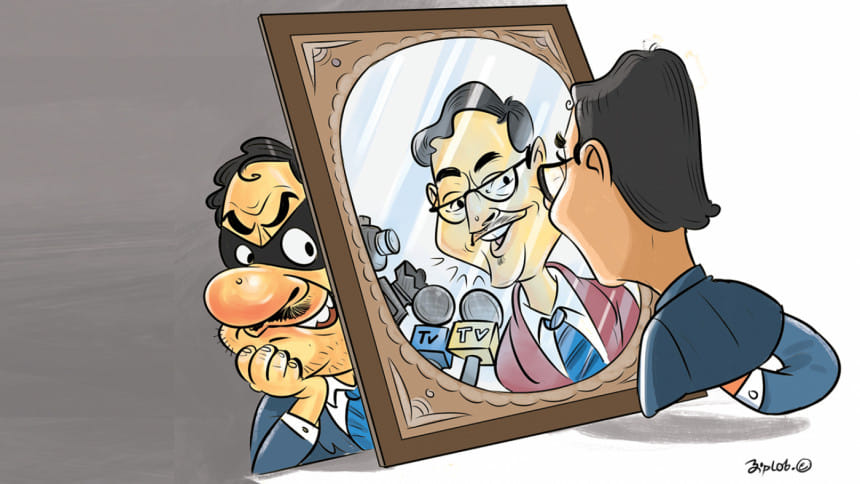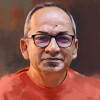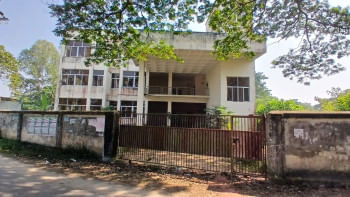Fix the error, not the mirror

Just imagine a day without a mirror.
You're getting ready for work, not knowing how you look. Your car, without rear-view mirrors, is on the busy road to office, negotiating the peak hour traffic. A girl is having her hairdo or makeup done before going out to meet friends, with no clue about her looks. A dentist tries to do a root canal job on a tooth deep inside a patient's mouth, basing on what he can see and what he can't. The outcome is obvious: a laughter or disaster.
It is impossible to live a life without a mirror. A tiny piece of glass yet it turns out to be a true friend in our life, always helping us stay safe. It's rather a one-sided friendship that keeps us informed of the truth and do things right. We need a reflection in the mirror to find out the problems in our looks, dress, makeup and the way we carry ourselves. It indicates what errors need to be fixed and how. Even if there is no flaw, we need our mirror to tell: 'Go ahead and feel good'. We just cannot think of a public appearance without a mirror vetting.
How do we react after finding faults in the reflection? We don't reject the reflection. We zero in on the wrong and get it right. We work on it till the mirror agrees with the fixing. No one wants to look funny, after all.
Who does not trust a mirror? Mirror is not devised to produce a deceiving image. It reflects as it is. Even the ugliest person on the planet keeps a mirror but doesn't say: "Oh no, it cannot be me or the mirror must be giving a wrong reflection to tarnish my image!" There may be a few faulty mirrors that give wavy reflections. But, none buys those for use, as everybody wants to get a true reflection.
Do we ask a mirror to reflect us as we wish for? Mirror is unable to make up things. If not crazy, no one will say: "Mirror, mirror make an error -- show me beautiful." One can create a mirror maze, but it's only a temporary visual distortion that would do more harm than good.
Though the media plays a far bigger role but it, in many ways, does the same job as a mirror, reflecting the good, the bad and the ugly in a society. An independent media strives to be perfect like a mirror, quickly helping people with the right information. It exposes devils, discloses evils and digs out the truth from a heap of lies in the society. News aside, it also provides views to shape any important opinion or help policymakers take right decision. Despite having a set of principles and code of ethics, journalists indeed make mistakes. When noticed or pointed out, a free media quickly corrects its mistakes. And like a mirror, the lone purpose of a free media is to be of help.
People need free media. Societies need it. Democracies need it. So do the governments. And, in a situation where freedom of expression is under attack and democracies are struggling, the free media is more required than ever before. But some people in the corridors of power-- the crooked politicians, the corrupt and criminals -- do not like to see their reflections in the media mirror. They doubt, publicly at least, their reflections, and angrily say: Oh no, it cannot be me, and then they go on to claim that it is a visual trick to taint their image. Instead of fixing the error, they try to fix the mirror.
That's the case with all the governments that have ruled Bangladesh. And that's how crimes and problems are harboured for long till those turn grave enough to get the governments out of power in the end. Sadly though, it's the people who suffer for the denial of their reflections in a free media.
Unscrupulous leaders, ominous elements within government machinery and the top-flight corrupt fancy having the media mirror to reflect the image they would like. But like a mirror, a free media just cannot be fixed. At worst, one can break it and live a life without a mirror. And the grave predicament of which was aptly voiced by the Founding Father of America and the third US president, Thomas Jefferson. "Our liberty depends on the freedom of the press, and that cannot be limited without being lost," he argued while co-authoring the Declaration of Independence way back in 1776.
Centuries later, the world, however, seemed to have moved far away from the Jefferson-era. Freedom of the press is now under the twin attacks of friendly (to power) media and authoritarian governments in ailing democracies.
People in power try things differently these days by covertly owning or manipulating a section of the media. Free media is quite reluctant yet to dig into its own backyard and admit about its weakness in public. But the reality is that the media landscape is split into two streams -- friendly media and free media. The friendly media stream is thickening and free media thinning out across the globe, especially in Bangladesh. The allegiance of main catalysts within overall media -- the journalists, leaders, and organisations -- is mostly aligned to power, not to the struggle for media freedom. The first attack on free media invariably comes these days from none but friendly media, much to the satisfaction of its backers in power.
Friendly media may appear to be reigning supreme at the moment. But is it really so? The reflections in the controlled media are just like visual distortions to people, who always turn to free media for authentic information. A free media is after all the mirror they need. And, press freedom, not the 'praise freedom', is what turns a media into that mirror.

 For all latest news, follow The Daily Star's Google News channel.
For all latest news, follow The Daily Star's Google News channel. 



Comments